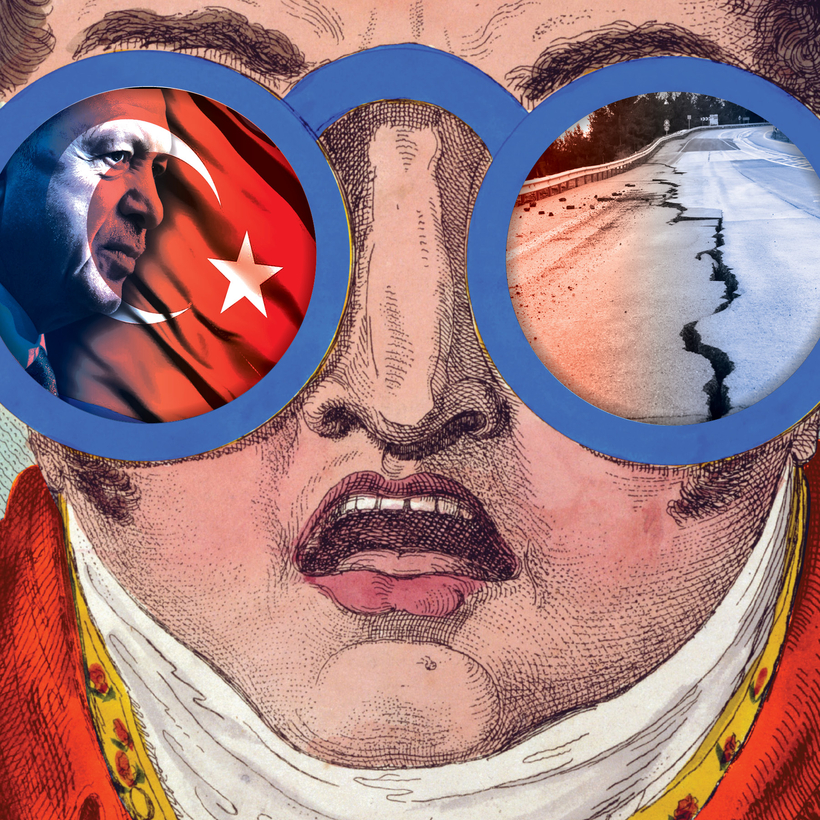On May 14, Turkey will hold its most important general election since 2002. The parallels between then and now are uncanny. Before that election, a devastating earthquake followed by the collapse of the Turkish lira saw Recep Tayyip Erdoğan, the pro-Islamist populist, sweep into power. This year, amid a drastically weakened economy, an even more terrible earthquake occurred. Now Erdoğan is forecast to lose. The ground is always shifting.
The tumultuous state of my homeland is all too familiar. In the last 10 years alone, the country has lived through the nationwide Gezi protests, which originated to protect an Istanbul park from government-backed developers; the influx of more than three million refugees from the Syrian war; unstoppable inflation; and the de-valuation of the Turkish lira. There was a bloody coup attempt and the transformation of the nation’s political system from a parliamentary democracy into a heavily centralized presidential one. And always, there was the ever present threat of earthquakes. Perhaps the only stability my generation of Turks has come to know is the tumult itself.
The first earthquake that ingrained the seismic map of Turkey in my consciousness dates back to my childhood. On August 17, 1999, when I was 13, I was visiting the United States when an earthquake with a 7.6 magnitude struck Turkey’s northeast region. On my return home I tried to make sense of the Istanbul neighborhoods that had been leveled and the new, sour smell of debris.
That November another earthquake struck. I discovered then that the tremors move in all directions at once, which made 40 seconds feel like a lifetime. We had to spend several nights in the garden of our apartment building for fear of the aftershocks.
This year, on February 6, an earthquake hit the southeast part of the country at 4:17 a.m. That morning I woke up to the buzzing of my phone from messages and missed calls asking: “Are you O.K.?” I knew something big and bad had happened somewhere in Turkey. The news was already echoing back from New York.
We remained bewildered for much of that day. Communications towers had been destroyed. Millions in the affected region were cut off from the rest of the country. No news was not good news; it was the eerie silence that takes over when cities and villages crumble in a matter of seconds.
Every day, for three weeks afterward, I watched the news day and night. The soundtrack of the earthquake relief began with a call employed by rescuers: “Sesimi duyan var mi?” (Can anyone hear my voice?) Any response to these calls was welcomed with cheers, followed by the excited news anchor announcing, “It’s yet another miracle.”
The only stability my generation of Turks has come to know is the tumult itself.
We have building codes in place. There is even a mandatory earthquake tax. However, for decades, the country has been on a building spree. Regular amnesties have been doled out to developers for already constructed, and occupied, substandard buildings. In fact, just three days before the earthquakes hit this February, it was reported that another amnesty was to be voted on in parliament, to ensure goodwill going into the general election.
As I lay awake in bed at night in Istanbul, I thought about escape routes from the room my widowed mother had arranged for me and my sister in her modest apartment. I kept a bottle of water next to my bed, my phone plugged in to charge, and held my dog a little closer at night so I could drag him with me into a “life triangle”—the voids of space near large pieces of furniture that are created when walls and ceilings collapse. In her bedroom, my mother would be too far to reach, but if the building collapsed and I could survive, I could call for help. That’s if we were lucky and the building fell down in solid pieces and didn’t become a mere cloud of dust. The country is inherently unstable, say the seismologists. They state that Istanbul will be hit by a major earthquake before 2030.
Sadness and courage replace fear in the moment of these thoughts. We grew up not only with earthquakes but with bombings and explosions, coup attempts and political assassinations, imprisonments for reading the wrong poems and the wrong books, for listening to music in the wrong language, for not being Turkish enough, for being too religious, or not religious enough. This feeling of life and existence hanging by a thread seems ever so familiar.
With the elections happening next weekend and the possibility of Erdoğan’s People’s Alliance being defeated by the Nation Alliance, a coalition of six parties headed by Kemal Kiliçdaroğlu, there is much discussion about a new chapter, about stability. Change is necessary, but will anything change? The fall of coalition governments colored my childhood.
I do not come from a political lineage; we are a “normal” middle-class family. Yet every generation has been affected by the complex political history of my homeland. This October will mark the 100th anniversary of the Turkish Republic, but such is the never-ending battle of repression and resistance that our national identity still feels uncertain. Without basic human dignity and the right to live equally and freely, it seems that even those of us going about our daily life will continue to ask, “Can anyone hear my voice?,” while we lie here, awake, hoping to be pulled from under the rubble.
Emine Gözde Sevim is a Photo Editor for Air Mail, an award-winning photographer, and the author of Embed in Egypt: A Story Without a Beginning


